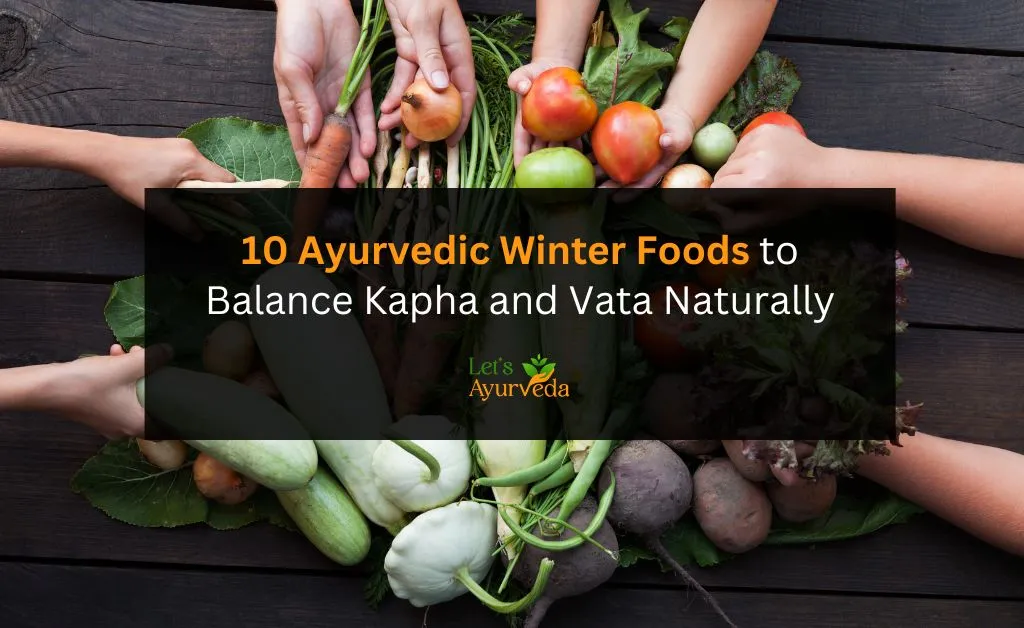Winter can be challenging, especially for those whose Kapha and Vata doshas get imbalanced during the colder months. According to Ayurveda, diet plays a crucial role in maintaining balance and harmony in the body. When we eat foods aligned with our doshas, we enhance digestion, boost immunity, and keep our energy levels steady.
In this post, we'll dive into 10 Ayurvedic winter foods that help balance Kapha and Vata. Plus, we'll explain how each food supports your health and offer tips to include them in your diet. Let’s get started!
The Winter Dosha Imbalance
Cold, dry, and heavy weather often aggravates Vata and Kapha doshas. Vata, associated with air and space, can become excessive, causing dryness, anxiety, and poor digestion. Meanwhile, Kapha, linked to water and earth, tends to increase, leading to sluggishness, weight gain, and congestion.
If left unchecked, this imbalance can make you feel fatigued, bloated, or constantly battling winter blues. So how do you regain control?
The Struggles of an Imbalanced Diet
You may find yourself craving sugary treats or heavy comfort foods during winter, but these can worsen dosha imbalances. For example:
-
Excessive sweets increase Kapha and cause lethargy.
-
Cold or raw foods can aggravate Vata, leading to dry skin or constipation.
-
Ignoring your dosha altogether? That’s a recipe for long-term discomfort and even seasonal illnesses.
But here’s the good news: A dosha-aligned winter diet can transform your health.
The Best Ayurvedic Winter Foods for Kapha and Vata Balance
Ayurveda emphasizes eating warming, moist, and grounding foods to combat winter's challenges. Let’s explore 10 must-have Ayurvedic winter foods that can restore balance and energize your body.
1. Ghee: The Golden Elixir for Vata and Kapha
Ghee, or clarified butter, is a staple in Ayurvedic cooking. It’s rich in healthy fats, which help counter Vata’s dryness and Kapha’s sluggish digestion.
How It Helps:
-
Nourishes tissues and boosts immunity.
-
Improves digestion by kindling Agni (digestive fire).
-
Acts as a carrier for herbs, enhancing their effectiveness.
Pro Tip: Add a teaspoon of ghee to your morning rice porridge or drizzle it over roasted winter vegetables.
2. Ginger: The Spicy Superfood
Fresh ginger is a powerful Ayurvedic remedy to warm the body, enhance digestion, and detoxify Kapha.
How It Helps:
-
Reduces bloating and gas caused by Vata imbalance.
-
Clears mucus and respiratory congestion linked to Kapha.
Pro Tip: Sip on ginger tea with lemon and honey to keep yourself warm and your digestion strong.
3. Sesame Seeds: Winter’s Best Energizer
Sesame seeds are incredibly grounding and warming, making them ideal for calming Vata and Kapha.
How It Helps:
-
Rich in calcium and magnesium, promoting joint health.
-
Contains healthy oils that moisturize dry skin and hair.
Pro Tip: Use sesame oil for cooking or make a sweet winter treat with sesame seeds, jaggery, and ghee.
4. Turmeric: Nature’s Anti-Inflammatory
Turmeric, the golden spice, has antioxidant and anti-inflammatory properties that protect your body from winter illnesses.
How It Helps:
-
Reduces Kapha’s mucus buildup.
-
Supports Vata by improving circulation and calming the nervous system.
Pro Tip: Enjoy a warm cup of golden milk (turmeric, ghee, milk, and black pepper) before bed.
5. Root Vegetables: Earthy and Grounding
Root vegetables like carrots, sweet potatoes, and beets are grounding foods perfect for balancing Vata.
How They Help:
-
Provide essential vitamins like A and C to boost immunity.
-
Promote digestion with their high fiber content.
Pro Tip: Roast root vegetables with spices like cumin and coriander for a comforting winter side dish.
6. Almonds: A Nutrient Powerhouse
Almonds are a fantastic source of healthy fats, protein, and vitamins, making them a must-have winter food for Kapha and Vata types.
How They Help:
-
Combat Vata’s dryness by nourishing the skin and hair.
-
Provide sustained energy, reducing Kapha-induced sluggishness.
Pro Tip: Soak almonds overnight, peel them, and eat them with a pinch of saffron for a luxurious Ayurvedic snack.
7. Lentils: Light Yet Filling
Lentils are grounding and warming, which helps pacify both doshas. Plus, they’re an excellent vegetarian protein source.
How They Help:
-
Promote easy digestion, preventing Kapha-related heaviness.
-
Keep Vata types feeling satisfied and balanced.
Pro Tip: Make a hearty dal (lentil soup) spiced with turmeric, cumin, and ginger.
8. Cinnamon: Sweet and Spicy Comfort
Cinnamon is a warming spice that not only satisfies your winter sweet cravings but also supports Kapha and Vata balance.
How It Helps:
-
Boosts circulation, keeping you warm.
-
Enhances digestion and reduces Kapha congestion.
Pro Tip: Sprinkle cinnamon on your morning oatmeal or brew it in your tea for a cozy flavor boost.
9. Mung Beans: Detox and Nourish
Mung beans are considered a tridoshic food in Ayurveda, meaning they balance all doshas.
How They Help:
-
Light yet nourishing, making them perfect for Kapha types.
-
Easy to digest, which soothes Vata.
Pro Tip: Cook a simple mung bean soup with ginger and cumin for a comforting winter meal.
10. Dates: Nature’s Energy Boosters
Dates are sweet, warming, and nourishing, which makes them ideal for combating Vata’s dryness and Kapha’s lack of energy.
How They Help:
-
Provide instant energy and essential minerals like potassium.
-
Moisturize the body from within.
Pro Tip: Blend dates with warm milk and a pinch of cardamom for a delicious winter drink.
Practical Tips to Incorporate These Foods
-
Start your day with a warm breakfast like porridge or khichdi.
-
Use warming spices like ginger, cinnamon, and turmeric in your cooking.
-
Stay hydrated with herbal teas to keep Kapha and Vata balanced.
-
Avoid cold, raw, or processed foods that can aggravate your doshas.
Why It’s Important to Act Now
Winter is the season when both Kapha and Vata are most vulnerable to imbalances. By incorporating these foods into your diet, you’re not just nourishing your body but also fortifying your mind against seasonal stress and illness.
Take small steps today, and you’ll notice a significant improvement in your energy, digestion, and overall well-being.
Final Thoughts
Balancing Kapha and Vata during winter doesn’t have to be complicated. With these Ayurvedic foods, you’ll enjoy the season feeling warm, energized, and healthy.
Try adding these foods to your meals, and share your experience with others. Let’s make this winter the healthiest one yet!
Also Read:






